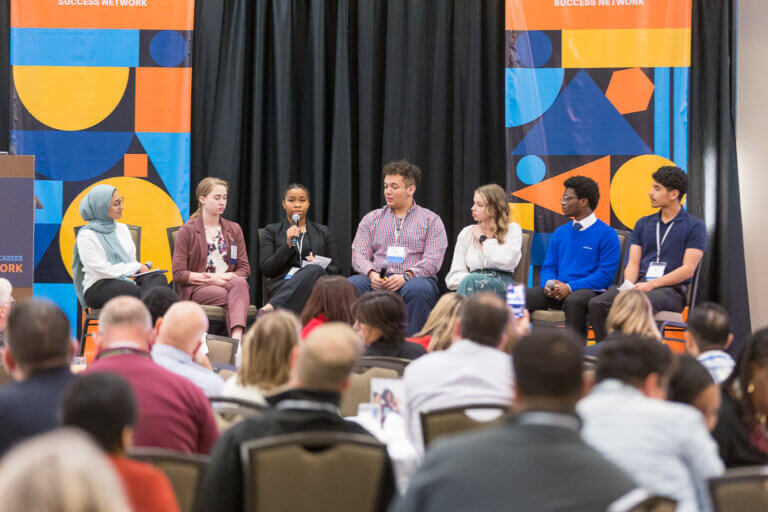EdSystems is committed to advancing racial equity across all of our efforts. In our October 2020 public statement, we adopted the goal to advance racial equity within our community networks by listening and engaging with students, families, and educators that interact with the education system. One of the steps we took to operationalize this statement is to create the Illinois 60 by 25 Network Student Advisory Council (SAC), a student engagement initiative, in partnership with fellow Network Organizers Advance Illinois and the Illinois Student Assistance Commission (ISAC). The goal of the SAC is to gather feedback on how students experience various initiatives that the Network supports and help us better understand what kinds of supports are most useful as students navigate the education system. We intentionally selected students who represent the state’s racial and geographic diversity to get varied perspectives.
What Did We Do to Engage Students?
In 2020–21, we hosted three SAC meetings with our partners, Advance Illinois and ISAC. In addition, SAC representatives presented a session on Student Voices during the annual Illinois 60 by 25 Network Annual Meeting in February. As a result, SAC members had opportunities to share their perspectives to inform the Network’s efforts and statewide policy, deepen their knowledge on issues that advance educational equity, and strengthen their understanding of Illinois’ education policy and practice landscape.
Because students are from different communities, we offered SAC members the opportunity to get to know one another and build community during the first meeting. We also learned where students get information to decide what they want to do after high school. At the second meeting, we introduced students to the ISAC Student Portal and the Illinois Postsecondary Profiles. We asked the SAC to develop creative ways to share these resources with peers at their schools, and they rose to the challenge! You can find their presentations here. At the third meeting, we discussed how students make decisions about the careers they want to pursue, shared information on high-demand jobs, the qualifications needed to pursue those jobs, what they pay, and the difference between the minimum wage and a living wage.
What Are We Learning from Students?
Centering Student Voices and Experiences Deepens their Engagement
As an organization that typically engages more with adults than directly with students, we affirmed that centering student voices and experiences leads to deeper student engagement and strengthens their agency. When asked in a year-end survey what they valued most about their involvement in the SAC, one participant noted:
“What I found most valuable was that our thoughts and opinions were constantly asked for and we had a lot of input into resources and programs that would be implemented into schools. Our voices were valued, and we got to share our experiences at our school, and we got to take away some resources from the meeting to share with our schools.”
Students Appreciate a Holistic Approach to College and Career Readiness
We established the SAC during a very challenging time for students. Many lost friends and family members to the COVID-19 pandemic, witnessed the most sustained demonstrations demanding racial justice that we have seen in decades, and were affected by economic uncertainty due to their own job loss or that of family members. These experiences underscored the urgency of using a holistic approach when working with students. As one student wisely noted at the annual meeting, “If you support students’ mental health, the rest will follow.”
Students Want to Balance Passion and Income When Choosing Careers
When asked what is most important in selecting a career, most SAC members indicated that doing something they are passionate about or good at is very important. However, when they understood the threshold to earn a living wage salary, students indicated that they would also consider this. Students need to understand the connection between the careers they want to pursue and how those careers will support their preferred lifestyles.
Students Are Eager to Learn About Other Communities and to Share Resources
While many SAC members are active in their schools and communities, most do not interact with students from other communities and appreciate learning from and sharing resources with other students. One student shared, “Most valuable to me was learning about other students’ experiences in schools throughout Illinois.” Another said, “I loved being able to work with my peers and have the privilege to access and share resources.”
What’s Next for Student Engagement?
EdSystems will continue to work with our partners to listen to the SAC and provide them with resources based on their needs. For example, several SAC members indicated that they want more information on FAFSA and scholarships. Therefore, we will collaborate with ISAC to offer one-on-one and group sessions on these topics in school year 2021–22.
We will also continue to provide opportunities for the SAC to share what they learn with their peers and encourage the adults we work with to lift up students as ambassadors for tools and policies used to plan for life after high school, emphasizing a holistic approach. Further, we will embed the insights we gained from students when discussing career pathway strategies with adults to ensure that the information is relevant and accessible.
Finally, to keep the SAC and alumni informed and engaged, we will work with them to develop a newsletter and other social media tools to share insights and resources.


